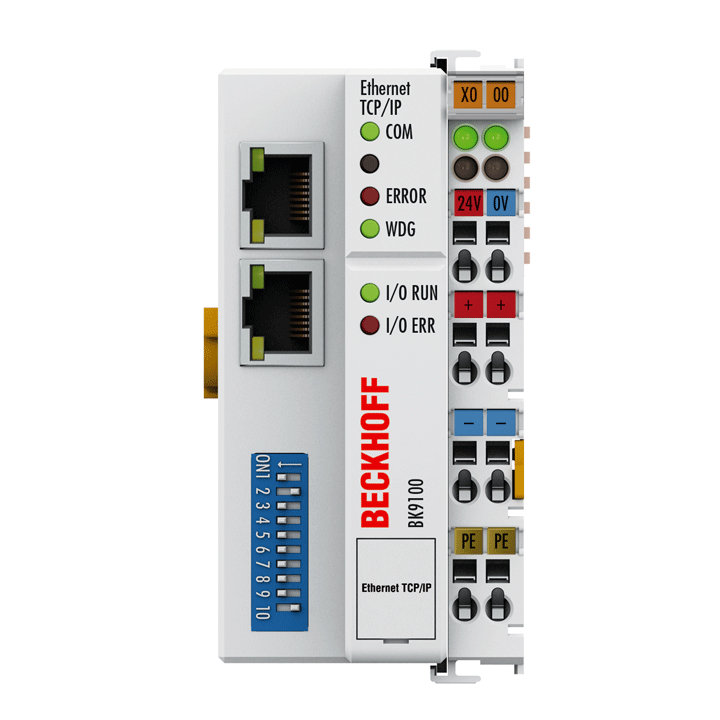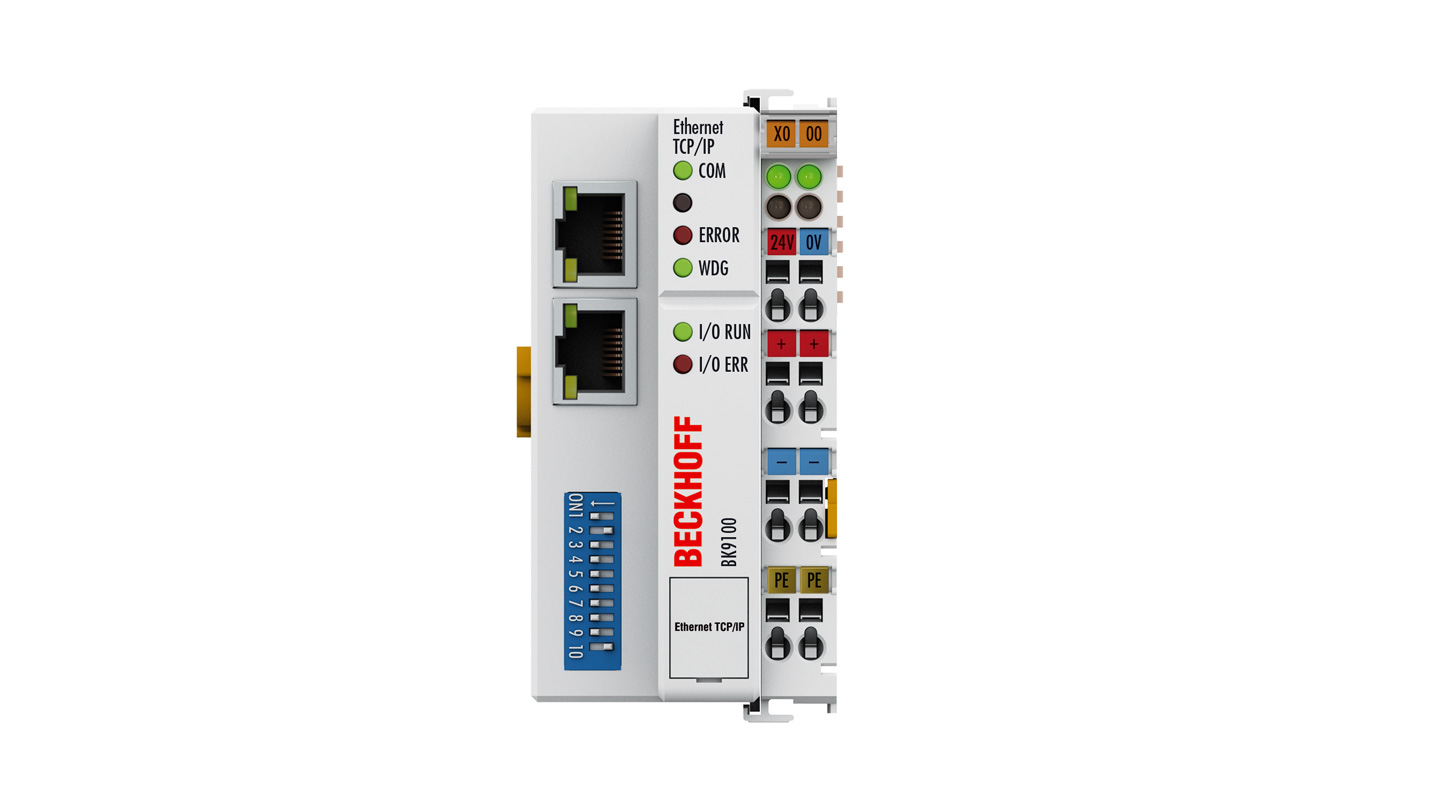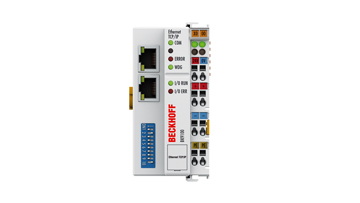
The BK9100 Bus Coupler connects Ethernet with the modular, extendable electronic terminal blocks. One unit consists of one Bus Coupler, any number from 1 to 64 terminals and one end terminal. With the K-bus extension, up to 255 Bus Terminals can be connected.
The Bus Couplers recognize the terminals to which they are connected, and perform the assignment of the inputs and outputs to the words of the process image automatically. The BK9100 Bus Coupler supports 10 Mbit/s and 100 Mbit/s Ethernet. Connection is through normal RJ45 connectors. The IP address is set on the DIP switch (offset to a freely selectable start address). In networks with DHCP (a service for the allocation of the logical IP address to the physical node address [MAC-ID]) the Bus Coupler obtains its IP address from the DHCP server.
Unlike the BK9000, the BK9100 has an additional RJ45 port. Both Ethernet ports operate as 2-channel switches. The I/O stations can thus be configured with a line topology, instead of the classic star topology. In many applications this significantly reduces the wiring effort and the cabling costs. The maximum distance between two couplers is 100 m. Up to 20 BK9100 Bus Couplers are cascadable, so that a maximum line length of 2 km can be achieved.
The BK9100 supports ADS TwinCAT system communication. TwinCAT I/O makes available configuration tools and Windows NT/2000/XP drivers for programs in any desired high-level language (DLLs) and for Visual Basic applications (ActiveX). Applications with OPC interfaces can access ADS (and therefore the BK9100 or BK9050) via an OPC server. In addition to ADS, the Bus Coupler supports Open Modbus (Modbus TCP), a simple, widespread master/slave protocol based on TCP/IP.
Product status:
regular delivery
Product information
| Technical data | BK9100 |
|---|---|
| Number of Bus Terminals | 64 (255 with K-bus extension) |
| Max. number of bytes fieldbus | 512 byte input and 512 byte output |
| Digital peripheral signals | 512 inputs/outputs |
| Analog peripheral signals | 128 inputs/outputs |
| Configuration possibility | via KS2000 |
| Protocol | TwinCAT ADS, Modbus TCP, Beckhoff real-time Ethernet |
| Data transfer rates | 10/100 Mbit/s, automatic recognition of the transmission rate |
| Bus interface | 2 x RJ45 (2-channel switch) |
| Data transfer medium | 4 x 2 twisted pair copper cable; category 3 (10 Mbit/s), category 5 (100 Mbit/s) |
| Power supply | 24 V DC (-15%/+20%) |
| Input current | 70 mA + (total K-bus current)/4, 500 mA max. |
| Starting current | 2.5 x continuous current |
| Recommended fuse | ≤ 10 A |
| Current supply K-bus | 1750 mA |
| Power contacts | max. 24 V DC/max. 10 A |
| Electrical isolation | 500 V (power contact/supply voltage/fieldbus) |
| Topology | line or star wiring |
| Cascading | up to 20 BK9100 or max. line length 2 km |
| Distance between stations | 100 m between hub/switch and bus coupler or between bus coupler and bus coupler |
| Weight | approx. 170 g |
| Operating/storage temperature | -25…+60°C/-40…+85°C |
| Relative humidity | 95%, no condensation |
| Vibration/shock resistance | conforms to EN 60068-2-6/EN 60068-2-27 |
| EMC immunity/emission | conforms to EN 61000-6-2/EN 61000-6-4 |
| Protect. rating/installation pos. | IP20/variable |
| Approvals/markings | CE, UL, ATEX, IECEx, DNV GL |
| Ex marking | ATEX: II 3 G Ex ec IIC T4 Gc IECEx: Ex ec IIC T4 Gc |
| Housing data | BKxxxx, BCxxxx |
|---|---|
| Design form | compact terminal housing with signal LEDs |
| Material | polycarbonate |
| Dimensions (W x H x D) | 51 mm x 100 mm x 69 mm |
| Installation | on 35 mm DIN rail, conforming to EN 60715 with lock |
| Side by side mounting by means of | double slot and key connection |
| Marking | labeling of the BZxxx series |
| Wiring | solid conductor (s), flexible conductor (st) and ferrule (f): spring actuation by screwdriver |
| Connection cross-section | s*: 0.08…2.5 mm², st*: 0.08…2.5 mm², f*: 0.14…1.5 mm² |
| Stripping length | 8…9 mm |
| Current load power contacts | Imax: 10 A |
*s: solid wire; st: stranded wire; f: with ferrule
Loading content ...
Loading content ...
Loading content ...
Loading content ...
© Beckhoff Automation 2024 - Terms of Use




